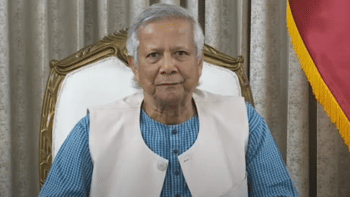Mother earth, wailing humanity, sacrificial lambs

Slovakia, the tiny republic in the middle of Europe has imparted a lesson that the high and mighty in a disordered world would do well to listen to. Falling on the route of the 21st century's biggest surge in migration driven by wars, chilling insecurity and severe economic hardship, the country has taken a significant moral lead. Some 10,000 Slovaks in a populace of 5 million signed a petition titled 'Plea to humanity' and put it on the internet. Huge outpourings of sympathy and support welled up from across Europe to the cause flagged off by civil society dictated by conscience.
The Slovaks made three points: One, that their government accepting 100 Christian migrants is not only not enough but also discriminatory; two, it should embrace refugees with open arms irrespective of religious or ethnic origins; and three, they bluntly said that joining the EU for money was selfish without discharging the responsibilities such a union devolved on the partners.
In parallel, the movers of the petition have not failed to notice a neo-Nazi profile within the frame.
Europe is deeply troubled and divided in matters of dealing with the waves of refugees outside the set parameters of providing political asylum and granting entry to economic refugees. The countries with stronger economies are obviously the preferred destinations of the migrants. But the EU members are apparently moving in the direction of accepting numbers proportionate to their abilities.
Let's face it, multilateralism had failed to address the root causes of this stupendous migration that lay in Myanmar, Syria and IS' dominated territories. That being the case, it now becomes obligatory on the part of powers that be to cope with the consequences of their failure.
There is no point magnifying the neo-Nazi, pro-right or racist fears that are more than balanced out by the long-term dividends promised by migrants to the host countries. It is a well-researched finding that western countries have hugely benefited economically from the enterprising presence of other nationalities in them. More to the point, without being blunt, the aging population of European countries some of which have shown a negative growth in procreation should be taking in more of younger people from developing countries. This is considered essential for the long-term sustenance of the developed economies.
The fear of unwanted import of extremism is better tackled at the roots namely drastically reducing the space for inequality, poverty and discrimination.
Coming to the home front, there is an issue with economic governance, the new genre of protective umbrella, we hope, there is to unfurl in a weather that harbours 'ready money as Aladdin's lamp.'
The communication minister has been his usual enthusiastic self in assuring the commuters that no increase in transport fare should follow the gas price hike till the government has drawn up a revised rates chart in consultation with stakeholders. But the red rug to the bull has been flung to provoke it to do some aggressive purchase. Even though bull fight as a sport is banned in its place of birth — Spain, lure of prize money, as it were, remains a pastime with our transport owners with each raise in fuel costs.
Within a few days of around 27 plus percent increase in gas price 'anarchy is going on' in the transport sector, some Bangla newspapers reported with a screaming headline!
Public transport system in Dhaka comprising buses, mini-buses, tempos and other three-wheelers are gas-based, let alone bigger vehicles. As though natural gas is a finite resource with no ceiling to be put on conversions; but that is a different story. For the moment, we are concerned with the repercussion of a lump increase in the gas price. Shouldn't the authorities have thought through the likely consequences and taken safeguards against charging extortionist fares from the passengers before announcing the increase? In the first place, the spike should have been staggered; secondly, the justification for increase spelled out in clear terms; and last but not least, an indicative fare chart, based on a formula, should have come as part of the package. Understandably, taking that route would have entailed diligent persuasion with the transport owners which the authorities seemingly avoided for reasons best known to them but not beyond guessing. So, the short-circuiting of the process allowing a field day for transport operators to fix the rates arbitrarily as the commuters silently or not-so-silently endure. These unwanted doses of tension should be averted.
Overall, it came foisted on the commuting public without sufficient notice. First, the finance minister struck a populist note assuring a reduction in the oil price in a matter of weeks. The import price had dropped to a half of the previous level and yet the BPC persisted in hanging on to the artificial price level. While the finance minister's positive hint at bringing down oil price still suspends in the air, other energy costs including even that of electricity has been raised. If it was an attempted soft-peddling of hard news on the pipeline to the consumers, the latter couldn't brush aside the impression of being left as bleating lambs.
The writer is Associate Editor, The Daily Star.


 For all latest news, follow The Daily Star's Google News channel.
For all latest news, follow The Daily Star's Google News channel. 



Comments